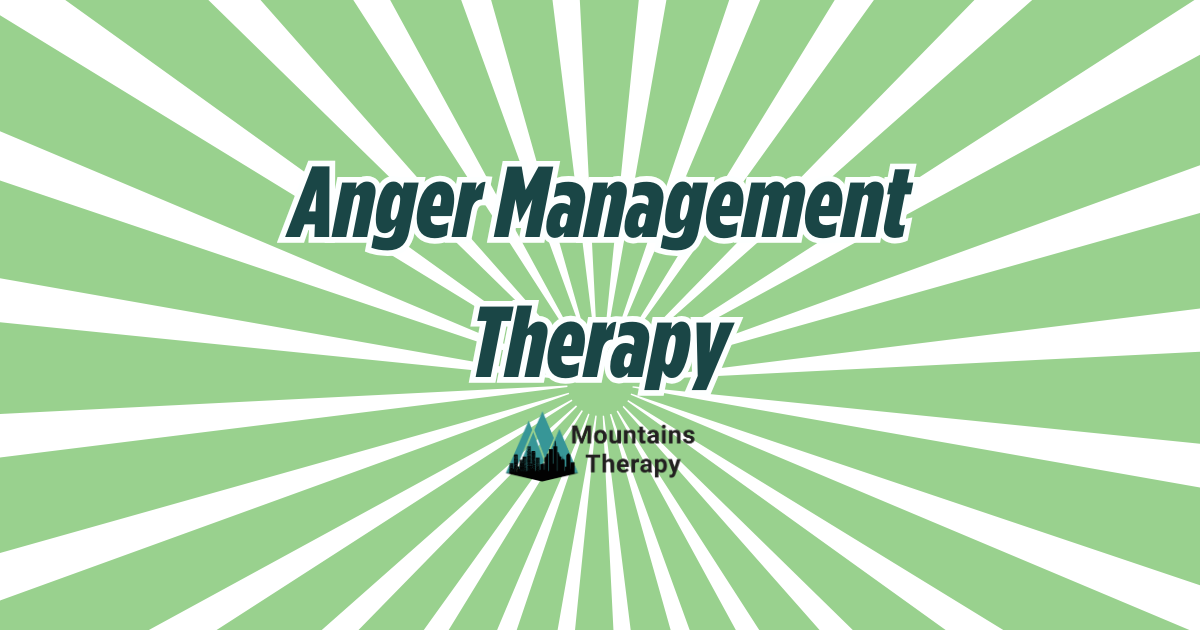Anger Management Counseling in Montclair, NJ: Learn How to Control and Understand Your Anger
Learn more about Anger Therapy.
In This Blog, You’ll Learn:
- What anger management is and why it matters
- Common myths vs. facts about anger
- Signs that you may benefit from anger management therapy
- How therapy helps you manage anger effectively
- Services and treatments we offer at Mountains Therapy
Understanding Anger and Its Impact
Anger is a normal human emotion, but when it becomes intense, unpredictable, or harmful, it can impact your health, relationships, and overall well-being. At Mountains Therapy in Upper Montclair, NJ, we specialize in helping individuals understand the root causes of anger, develop emotional regulation skills, and express feelings in healthier, more productive ways. Our experienced therapists in Montclair, NJ offer a supportive and non-judgmental environment to help you regain control and find balance.
Signs You May Benefit From Anger Management Therapy
Recognizing these signs is an important first step toward change. Therapy can help you break the cycle of frustration and reaction.
- You often feel out of control when angry
- Others have expressed fear or discomfort around your temper
- You experience guilt or regret after outbursts
- Anger is affecting your relationships or work performance
- You find yourself suppressing emotions until they erupt
Myths vs. Facts About Anger
- Myth: “Expressing anger loudly is the best way to release it.”
Fact: Uncontrolled anger can reinforce negative patterns and damage relationships. Therapy helps you express anger calmly and effectively. - Myth: “Only aggressive people need anger management.”
Fact: Many people who appear calm struggle with internalized anger or passive-aggressive tendencies. Therapy supports everyone who wants to manage emotions better. - Myth: “Anger is always bad.”
Fact: Anger is a natural emotion that signals something important, but learning how to channel it productively makes all the difference.
How Therapy Helps You Manage Anger
At Mountains Therapy, our approach to anger management is collaborative and tailored to your unique needs. Through therapy, you’ll learn to:
- Identify and understand triggers
- Strengthen communication and conflict resolution skills
- Develop healthier emotional responses
- Build mindfulness and self-regulation techniques
We use evidence-based treatments to help you achieve long-lasting change and greater emotional stability.
How Our Treatments Help With Anger
- ACT – Acceptance Commitment Therapy in Montclair, NJ:
ACT helps clients accept their emotions instead of fighting them. You’ll learn how to respond to anger in ways that align with your values rather than reacting impulsively. - CBT – Cognitive Behavioral Therapy in Montclair, NJ:
CBT helps identify and change negative thought patterns that fuel anger. It teaches tools for self-awareness and impulse control. - DBT – Dialectical Behavioral Therapy in Montclair, NJ:
DBT focuses on emotional regulation, distress tolerance, and mindfulness skills to reduce explosive reactions and improve communication. - EFT – Emotionally Focused Therapy in Montclair, NJ:
EFT is especially helpful for couples. It helps you understand emotional triggers, rebuild trust, and express anger in healthy ways. - Mindfulness-Based Therapy in Montclair, NJ:
Mindfulness increases awareness of bodily and emotional cues before anger escalates, helping you stay calm and grounded. - Psychodynamic Therapy in Montclair, NJ:
Psychodynamic therapy explores the deeper, often unconscious roots of anger such as past trauma or unmet needs. This helps you gain insight and emotional freedom. - SFT – Solution Focused Therapy in Montclair, NJ:
SFT helps you focus on what’s working and build solutions instead of staying stuck in frustration. It’s a practical and goal-oriented way to manage anger effectively.
Anger Management Services We Offer
- Individual Anger Management Counseling in Montclair, NJ:
Personalized one-on-one sessions to uncover triggers, improve self-control, and strengthen coping skills. - Couples Anger Management Counseling in Montclair, NJ:
Work together to resolve conflicts, enhance communication, and build a calmer, more connected relationship. - Online Anger Management Therapy in Montclair, NJ:
Access confidential Online Therapy sessions from the comfort of your home. - In Person Anger Management Counseling in Montclair, NJ:
If you’re in Montclair, Bloomfield, Glenridge, Upper Montclair, or nearby areas, our in-person sessions offer a safe space for healing and growth.
FAQs About Anger Management Therapy
- What therapy is best for anger?
CBT and DBT are among the most effective therapies for anger because they help identify thought patterns and teach emotional regulation techniques. - What is an anger therapist?
An anger therapist is a licensed mental health professional who specializes in helping clients understand the causes of anger and develop tools to manage it effectively. - What triggers ADHD rage?
ADHD rage often stems from overstimulation, frustration, impulsivity, or emotional dysregulation, which can make managing intense feelings more difficult. - What emotion is behind anger?
Anger often masks deeper emotions like fear, hurt, sadness, or frustration. Therapy helps uncover and address these underlying feelings. - What is the most effective therapy for anger?
Cognitive Behavioral Therapy (CBT) is considered the most evidence-based and effective treatment for anger management. - What mental illness causes rage outbursts?
Conditions like ADHD, Bipolar Disorder, Intermittent Explosive Disorder, PTSD, and certain personality disorders can contribute to rage outbursts. - What is the best mood stabilizer for anger?
Medication should be prescribed only by a psychiatrist or medical professional. Mood stabilizers like lithium or anticonvulsants are sometimes used when clinically indicated. - What helps with severe anger issues?
A combination of therapy, stress management, mindfulness, and healthy lifestyle changes can significantly help reduce severe anger episodes. - What is the “happy pill” for anger?
There isn’t one single “happy pill.” Antidepressants or mood stabilizers may be used if depression or anxiety is linked to anger, but therapy remains key. - Why do I get so angry so easily?
Chronic stress, unresolved trauma, hormonal imbalance, or unaddressed emotions can make you more prone to irritability or quick anger. - How does anger therapy work?
Anger therapy helps you identify triggers, build self-awareness, and learn new strategies to regulate emotions before they escalate. - What type of therapist helps with anger issues?
A licensed therapist specializing in anger management, CBT, or DBT can help you understand and manage your anger effectively. - Which therapy is best for anger issues?
CBT, DBT, and Mindfulness-Based Therapies are highly effective for managing anger and emotional reactivity. - What is therapy for anger issues called?
It’s commonly known as Anger Management Therapy or Anger Management Counseling. - How long does anger therapy take?
The duration varies per person. Many see progress after 8–12 sessions, but lasting change often depends on consistency and personal goals. - How to help someone with ADHD rage?
Stay calm, give space, avoid criticism, and encourage therapy or coping tools such as mindfulness and structured routines. - What does an ADHD outburst look like?
It can involve yelling, frustration, crying, or impulsive actions, often followed by regret or exhaustion once the emotion passes. - How to calm down an ADHD tantrum?
Lower stimulation, speak softly, use grounding techniques, and allow time for emotional regulation. - Why do people with ADHD get frustrated so easily?
Difficulties with executive function, emotional control, and overwhelm can make frustration more frequent and intense. - What is the 24-hour rule for ADHD?
It encourages waiting 24 hours before responding to a frustrating situation, allowing time for perspective and emotional regulation. - Does ADHD rage get worse with age?
It can if untreated, but therapy and emotional awareness can greatly reduce symptoms over time. - What is the root emotion of anger?
Often fear, hurt, or a sense of injustice underlie anger responses. - What is the core emotion of anger?
The core emotion is typically linked to feeling unsafe, unheard, or disrespected. - What emotion is behind my anger?
For many, it’s a combination of fear, sadness, or shame. Therapy helps uncover what’s truly driving your anger. - What are the three emotions behind anger?
Fear, pain, and frustration are the most common root emotions. - What organ does anger come from?
In traditional Chinese medicine, anger is associated with the liver, symbolizing stored frustration or emotional imbalance. - What are the 4 roots of anger?
Hurt, fear, frustration, and injustice are the four main emotional roots that lead to anger.
Start Your Journey Toward Emotional Balance
Managing anger isn’t about suppressing it, it’s about understanding it. At Mountains Therapy in Montclair, NJ our compassionate therapists help you transform anger into awareness, strength, and emotional growth. Take the first step toward a calmer, more fulfilling life today.














